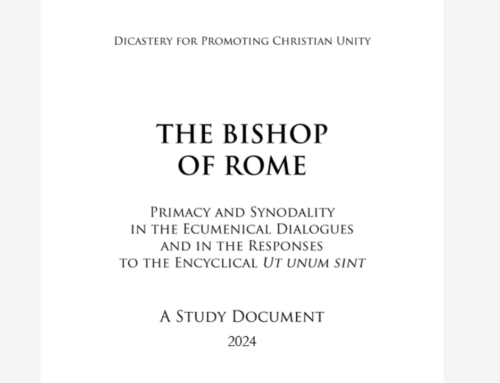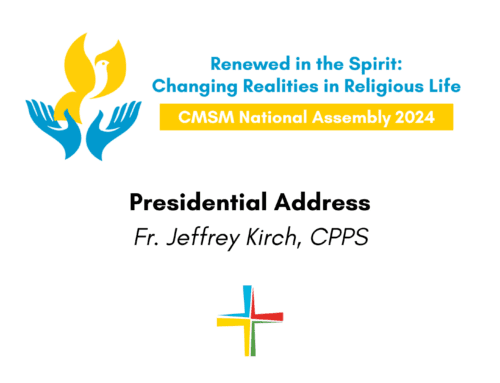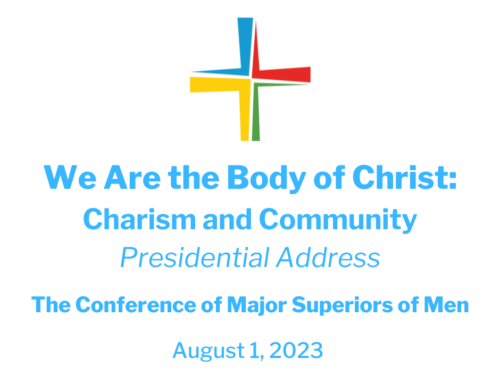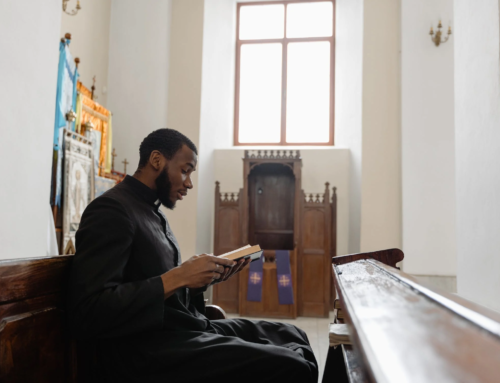In this essay, Fr. Aaron Wessman, GHM provides a list of resources he has found especially useful in his research on polarization, contextualizing their content and where they may be especially helpful.
Click here to download a copy of the essay.
As leaders of religious communities, polarization touches many aspects of our lives. We listen to our members as they talk about their struggle to serve fractured parishes or to minister to rancorous, divisive people. We cringe at the divisions existing between leaders in the Church. We seek to unite divided groups in our own communities. Sometimes, we even see the effects of polarization in our own hearts. I know this has certainly been the case for me personally.
To navigate, in a hopeful way, one of the most pressing issues in the contemporary period for the Church, I wrote the book The Church’s Mission in a Polarized World, recently published through New City Press. It was my attempt to make sense of the world in which we live, to provide a way for Christians (myself included) to consider their own engagement with a polarized culture, and to propose resources that Christianity provides for overcoming moments of intense division and hatred.
As I have presented on my book around the United States, I am often asked to provide a summary list of resources for further study and reading. What follows is a variation of the list that I provide. Much of the research listed below is integrated into my own book, but each source is worthy of its own close reading.
I hope these resources are helpful to those leaders seeking to guide their religious communities during polarized times.
Political Science and Polarization: The Work of Ezra Klein
Ezra Klein’s Why We’re Polarized is a foundational text on polarization that brings together decades of political science and other research regarding polarization in the United States. Klein, a journalist for The New York Times, provides an insightful narrative outlining why the USA is polarized, looking specifically at the consequences of geographical sorting, negative polarization, and the theme of identity. He argues that the United States’ current polarized moment is unique—in other words, polarization in the United States has worsened over the last five to six decades. We truly are in a uniquely problematic historical moment. For religious superiors, Klein’s usefulness is limited, in that his purpose is not to provide a theological analysis of the theme, nor to investigate specifically the effects of polarization on the Church. Nevertheless, this excellent, lucid, and well-argued book provides substantive context on the issue of polarization in American society.
Psychology and Polarization: The Work of Jonathan Haidt
A leading voice speaking about the intersection of psychology and polarization comes from social psychologist Jonathan Haidt. Both his work with co-author Greg Lukianoff, The Coddling of the American Mind, and his solo project The Righteous Mind, provide insight into the themes of the psychology of group dynamics and polarization, ‘cancel culture,’ and technology and polarization. To understand polarization, Haidt argues, we need to understand how human beings operate in groups. His body of work elucidates this reality well. Along with the texts above, an excellent introduction of some of his thought is found in an article he wrote for The Atlantic, “Why the Past 10 Years of American Life Have been Uniquely Stupid.” Haidt is also featured in many YouTube videos and podcasts. Whether it is his written work, or his contributions on other media, I try to follow anything Haidt provides.
A General Approach to the Theme of Polarization: The Work of Mónica Guzmán
For a general, easily accessible approach to the theme of polarization, from a very talented writer, written in view of addressing the challenges of division from a civic and relational perspective, I recommend Mónica Guzmán’s I Never Thought of it that Way. Guzmán has become a leading voice around the theme of polarization, especially as her work intersects with the extraordinarily influential group, Braver Angels. Her writing is personal, accessible, practical, and highlights the important theme of curiosity as an antidote to the challenge of polarization. Readers walk away from her writing equipped not only with helpful terms, concepts, and descriptions, but also with tools to overcome divisiveness and to talk to loved ones (or members of a religious community) with which one disagrees.
Polarization and How We Think: The Work of Adam Grant
An enjoyable and thought-provoking read, Adam Grant’s Think Again will help readers ‘think again’ about how we think, especially in polarized times. His work notes the challenges that accompany human reason, how our biases impede us from asking the right questions or from listening to our detractors—who often can assist us in finding the truth—and how the formation of groups and ‘group think’ can become, sometimes, a hindrance to the search for wisdom and truth. For religious leaders who have to engage diverse, intercultural communities, often consisting of mini-tribes or cliques, all the while navigating a fluid, changing world, I highly recommend Grant’s work. Though he writes with a primary eye to corporate professionals, his work is easily translatable to the task of leading religious communities.
Evangelical Christianity and Polarization: The Work of Andy Stanley
I have found it helpful when trying to digest the challenge of polarization to seek to understand how non-Catholic Christians are attempting to navigate division and their relationship to politics and faith. Andy Stanley, evangelical pastor of Atlanta’s North Point Ministries, provides an incisive analysis of how polarization is affecting his denominational group in his book Not in It to Win It. His style is refreshing, as the book reads like a well-crafted, poetic sermon, but does not come across as ‘moralistic.’ Leaders of religious communities will benefit from his copious references to scripture, his Christocentric prescriptions, and his self-critical appraisal of his own tradition. Though some of his theology, especially that around the Old Testament, could be enhanced by engaging the Catholic tradition, and though he could have focused more on Christ’s kenotic movement in the world as an antidote to polarization (as I do in my own book), these issues do not hinder his book from being a helpful resource for Catholic leaders.
Catholicism and Polarization: The Work of Charlie Camosy (and others)
There are a lot of excellent voices in the Catholic world speaking about the challenge of polarization. Because of space, unfortunately, I can only name a few.
To begin, I must mention John Allen, Jr., of Crux, who has published recently a provocative work through Word on Fire, called Catholics and Contempt: How Catholic Media Fuel Today’s Fights, and What to Do About It. One certainly should not miss it.
Another courageous voice comes from Georgetown Law lecturer Amy Uelmen, a woman who has literally given her life to overcoming division and deepening unity. Uelmen, a member of Focolare, is concerned with, among other themes, issues related to polarization and the classroom. Especially for religious involved in education, her work is important.
Finally, it is appropriate to close out this list of sources by referring to Catholic theologian Charles Camosy.
Camosy has spent many years reflecting on the challenge of polarization. In 2016, he co-edited a helpful volume titled Polarization in the US Catholic Church. For myself, this resource served as an entree into the theme. In 2022, Camosy published One Church: How to Rekindle Trust, Negotiate Difference, and Reclaim Catholic Unity. This text appeals to Catholics to rediscover and reflect upon their call to be united. To facilitate deeper understanding in the Church, Camosy provides an empathic, sometimes humorous, and always entertaining and insightful, description of the various groups comprising US-American Catholicism. Finally, Camosy is the series editor of Magenta. In this unique set of books, which includes my own, readers are introduced to voices seeking to provide Christians and other people of good will a way out of polarized times.






